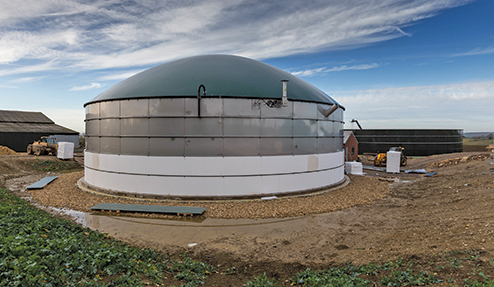Small-scale AD stalls as Feed-in Tarrifs cuts bite

Further cuts to support for anaerobic digestion that came into effect this week (1 October) have raised concerns about the future for small- and medium-scale plants.
Feed-in Tariffs (Fits) for new sub-500kW plants were cut 10% and tariffs for the 500kW to 5MW group fell 5% under the government’s degression mechanism.
With a number of larger-scale plants in the pipeline and likely to be built over coming months, there was a risk tariffs could fall further next April, NFU chief renewable energy advisor, Jonathan Scurlock said.
See also: Industry calls for greater AD support
“The AD industry is going through a period of rapid growth, with a lot of activity in the large-scale AD sector in particular.
| AD Fits 1 Oct 2014 – 31 March 2015 | |
|---|---|
| Installed capacity | p/kWh |
| 250kW or less | 11.21 |
| 250-500kW | 10.37 |
| >500kW | 90.2 |
“We estimate the number of AD plants could increase from 150 to 300 over the next couple of years, with one-third of those on-farm.”
But the lack of any separate Fits banding for small (about 100kW) AD under the existing tariff structure meant the growth of larger projects and subsequent support degression had unfairly squeezed the small-scale sector, where deployment remained relatively low, he said.
The only smaller projects that were likely to be viable were those that could maximise revenues from electricity, heat and digestate, he added.
“The industry has worked hard to bring down costs and make technology viable at this [small] scale, but the [Fits] cuts have more or less put a halt to further deployment at this level,” said Anaerobic Digestion and Bioresources Association chief executive Charlotte Morton.
“We’re calling for government to restore sub-250kW tariffs to a level which will allow the technology to grow again, and deliver its enormous potential to enhance the economic and environmental sustainability of farming.”
Fits were due for a comprehensive review after next year’s general election and Dr Scurlock said that the industry would press for greater distinction between small farm-based AD and commercial-sized projects.
A more proportionate regulatory framework was also needed to recognise the lower risks associated with smaller AD units and to allow more collaboration between farmers. In particular, T24 environmental permitting exemptions should be reviewed to allow easier transfer of feedstocks and digestate between farms, he suggested.
Greater value should also be given to the wider environmental benefits AD could deliver, such as nutrient management and protection of watercourses.
In recognition of that, trade association ADBA has changed its name to the Anaerobic Digestion and Bioresources Association.
“AD has always been about more than the biogas – we all value the nutrients and minerals in the digestate, too,” Ms Morton said.
